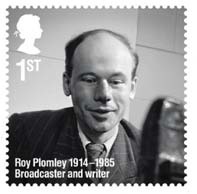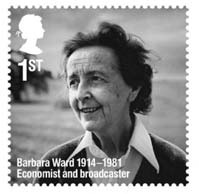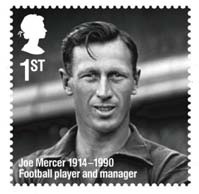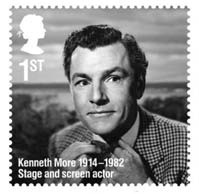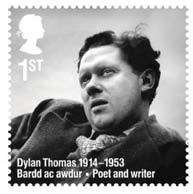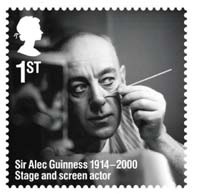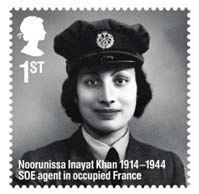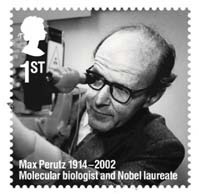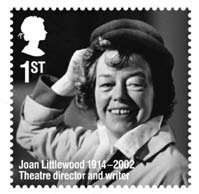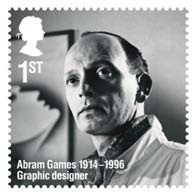Norvic Philatelics - GB New Stamps and Special Postmarks
Remarkable Lives - 25 March 2014
The
Ten
Stamps
Row 1: Roy Plomley, Barbara Ward, Joe Mercer, Kenneth
More, Dylan Thomas.
Row 2: Sir Alex Guiness, Noorunissa Inayat Khan, Max Perutz, Joan
Littlewood, Abram Games
The stamps - all 1st Class
Roy Plomley 1914–1985, Broadcaster and
writer
Roy Plomley took Desert Island Discs on air in 1942. His simple, elegant
idea was to invite guests from different professions and spheres of public
life to select eight pieces of music – the ‘discs’ – that they would want
with them if stranded on an imaginary Caribbean island. The radio show,
introduced with the theme tune ‘By the
Sleepy Lagoon’, came to British households in the midst of the
Second World War, offering a much-needed insight into lives lived beyond the
everyday. Plomley presented the programme for 43 years. On the guest list
were many notables, including royalty and five prime ministers, and Plomley
himself was a ‘castaway’ twice. He was awarded an OBE in 1975.
Roy Plomley was born in Kingston, Surrey. After working at an estate agency
and then in advertising and publishing, he moved on to acting and radio
announcing for a rival to the BBC. Escaping France with his wife ahead of
the occupying forces, he lived in Hertfordshire, where Desert Island Discs
was born. This, the longest-running radio entertainment show, is a living
database of international cultural history – a rich crew of individuals,
revealed in all their charm and idiosyncrasy through music and words.
Barbara Ward 1914–1981, Economist and broadcaster
Barbara Ward saw that for the world to survive and to thrive, fair sharing
of resources and wealth was imperative. With her husband Robert Jackson, an
administrator for the United Nations, she observed significant projects in
India and Africa, where she realised the importance of economic
relationships between established and emerging countries. A passionate and
powerful intellectual, as well as a prolific writer and lecturer, Ward
worked tirelessly to influence policy makers, persistently reminding them of
their international responsibilities.
Barbara Ward was born at Heworth, Yorkshire, into a family founded in the
Catholic and Quaker faiths. She studied in Paris and Oxford, and her career
spanned from wartime work at the Ministry of Information to journalism at
The Economist and the Schweitzer Professorship of Economic Development at
Columbia University, USA. Ward helped inspire the European Union and is
known as a pioneer of global environmental issues. In 1974 she was made a
Dame of the British Empire and two years later became Baroness Jackson of
Lodsworth. She also received the Jawaharlal Nehru Award for International
Understanding from the Government of India. She co-authored ‘Only One Earth’
for the 1972 UN conference on Human Development which was a landmark
publication that invented the ideas of ‘sustainable development’.
Joe Mercer 1914–1990, Football player and
manager
Joe Mercer embodied charm, sporting values and humble good humour combined
with great skill throughout a 50-year career in football as player and
manager. Seemingly always smiling, he was a distinguished competitor for
England, Everton and Arsenal, captaining the latter team in two FA Cup
finals and two League championships. After retiring from the pitch, Mercer
managed Sheffield United, Aston Villa and Manchester City, leading this last
team to victory in the FA Cup, European Cup Winners’ Cup and Football League
Cup.
Born in the Wirral, the son of a professional footballer, Joe Mercer joined
Ellesmere Port as a teenager. He made a reputation on the turf in the 1930s
and during the Second World War was a physical training instructor and
participant in British Army football across Europe. Mercer won three
championship medals, an FA Cup winners’ medal, as well as five full and 22
wartime international caps. He was voted Footballer of the Year in 1950 and
awarded an OBE. The legacy of ‘Uncle’ Joe Mercer lies in how fondly and
respectfully he is remembered by many in the sport.
Kenneth More 1914–1982, Stage and screen
actor
Kenneth More was the actor who made the character of the middle-class
Englishman his own. His career was founded upon carefully crafted roles
which explored this seemingly banal individual, to communicate comedy and
tragedy equally well. More became widely known as the driver of a veteran
motor car in Genevieve of 1953. Subsequently, he portrayed the Second World
War pilot Douglas Bader in Reach for the
Sky. More starred in several highly regarded films and television
series, including Doctor in the House,
The 39 Steps, The Forsyte Saga and Father
Brown, and was one of the most popular British and international
stars from the late 1950s through the 1970s.
Born in Gerrards Cross, Buckinghamshire, More was educated on the island of
Jersey. After some training as a civil engineer and an abortive attempt to
become a fur-trapper in Canada, he took a job at the Windmill Theatre in
London. Here his stage career began: he started to appear in comic
interludes between the risqué shows. His ability to distil the
characteristics of the Englishman led him to act for Noël Coward and to be
selected for Terence Rattigan’s premiere of The
Deep Blue Sea.
Dylan Thomas 1914–1953, Poet and writer
In his short life, Dylan Thomas navigated a stormy course through modern
literature, evoking the brilliance and pathos of human existence along the
way. With rich imagination, he crafted poems, prose and drama presenting
universal visions of everyday lives. Thomas’s most well-known text is the
radio drama Under Milk Wood, which
was later filmed starring Richard Burton, Elizabeth Taylor and Peter
O’Toole. He is also acclaimed for poems such as ‘And
Death Shall Have No Dominion’ and ‘Do
Not Go Gentle into That Good Night’, the latter written about his
dying father.
Dylan Thomas was born in Swansea to a teacher of English literature and a
seamstress. He published his first poems as a teenager and worked as a
freelance journalist before being taken up by the literary world from 1934.
He gained a reputation as a flamboyant saloon-bar poet on the London scene,
but he also wrote scripts for the Ministry of Information and the BBC and
tirelessly performed his work (and that of others) for radio. He died in New
York while on a performance tour, aged 39.
Sir Alec Guinness 1914–2000, Stage and
screen actor
Sir Alec Guinness first acted on screen in 1946, in Great
Expectations for David Lean, beginning an extraordinary film career
that would see him cast in a multitude of roles, including eight related
characters in Kind Hearts and Coronets,
a Jedi Knight in the original Star Wars
trilogy and John le Carré’s master spy George Smiley in two television
series. Guinness’s many memorable performances range from a colonel in The
Bridge on the River Kwai to several mischievous personalities in
dark comedies made by the quintessentially British Ealing Studios.
Born in London, to Agnes Cuffe, Guinness began life in poor circumstances,
but his determination to act was encouraged by John Gielgud. By the late
1930s, he was regularly appearing in classic plays, under directors such as
Michel Saint-Denis, Tyrone Guthrie and Gielgud. He continued to act on stage
– embodying characters created by William Shakespeare, Charles Dickens,
Fyodor Dostoyevsky, TS Elliot, Arthur Miller and Evelyn Waugh, among others
– but by the mid-1950s, film roles started to take up more of his time. He
won an Oscar in 1957 and an Academy Honorary Award in 1979. Guinness was
made a CBE in 1955, knighted in 1959 and made a Companion of Honour in 1994.
Noorunissa Inayat Khan 1914–1944, Special
Operations Executive (SOE) agent in occupied France
Noorunissa Inayat Khan became one of the silent heroes of the Second World
War. With the code name ‘Madeleine’, she worked as a wireless officer for
the British Special Operations Executive (SOE) in Paris during 1943, when
the city was occupied by Nazi forces. She evaded capture far longer than
expected in her role and continued to send important messages to London to
aid the French Resistance. She was betrayed, arrested and interrogated, but
she refused to give up her secrets. She was executed at Dachau by the
Gestapo in September 1944.
Born in Moscow to a Sufi teacher and an American mother, and descended from
the 18th-century Tipu Sultan of Mysore, Noorunissa Inayat Khan was educated
in Paris. Escaping to England after the fall of France, she joined the
Women’s Auxiliary Air Force, then took one of the most dangerous postings in
occupied territory. She maintained her views on non-violence
by not carrying a weapon. She was posthumously awarded the French Croix de
Guerre and the British George Cross, one of only three women to receive the
latter award for service during the Second World War. A memorial to her in
Gordon Square Gardens, London was unveiled by the Princess Royal in 2012.
Max Perutz 1914–2002, Molecular biologist and Nobel laureate
Max Perutz devoted most of his working life to the study of haemoglobin –
more precisely, to finding the position of the 10,000 atoms that make up its
structure and to explaining how it acquires an appetite for oxygen and is
induced to release it. For demonstrating how X-ray crystallography can be
used to determine the structure of a protein, he shared the Nobel Prize with
John Kendrew in 1962.
Born in Vienna, Max Perutz studied chemistry and moved to Cambridge in 1936
to pursue his research. Interned as an enemy alien at the outbreak of the
Second World War, he was sent to Canada but released in 1941 to continue his
work. He was the chairman of the Medical Research Council’s Unit (later its
Laboratory) for Molecular Biology, which now boasts eight Nobel Prizes,
including that for the discovery of the structure of DNA in 1953. Later in
life, Perutz turned to the study of Huntington’s disease. He was made a
Companion of Honour and received the Order of Merit; he also won the Lewis
Thomas Prize for his writings on science.
Joan Littlewood 1914–2002, Theatre director
and writer
Joan Littlewood revolutionised British theatre after the Second World War by
making the classics immediate and by turning raw material relevant to its
time into productions of international acclaim. Chief among them was the
eye-opening First World War entertainment Oh
What a Lovely War, which (together with A
Taste of Honey and Fings Ain’t
Wot
They Used T’Be) was created in close collaboration with her actors.
Littlewood was born in a working-class district of south London. She left
the Royal Academy of Dramatic Art early, and with Jimmie Miller (later known
as Ewan MacColl) she founded the agit-prop-inspired Theatre Union in
Manchester. After the Second World War, aiming to bring a fresh kind of
theatre to a new audience, the company toured the UK and Europe as Theatre
Workshop before settling in 1953 at the run-down Theatre Royal in London’s
East End. With the guidance of Littlewood’s partner, Gerry Raffles, came
hard-won recognition.
Littlewood, wanting to release everyone’s innate potential, also dreamed of
a place for learning and entertainment: The Fun Palace. Her ideas for this
project governed the rest of her life. After the death of Raffles in 1975,
Littlewood left theatre and wrote books, dividing her time between France
and England.
Abram Games 1914–1996, Graphic designer
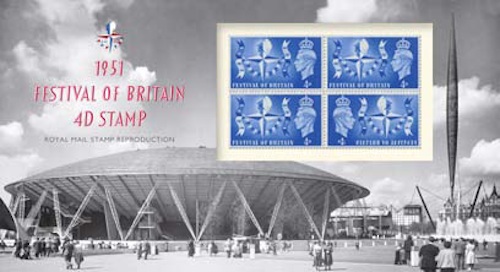
Abram Games designed almost 300 posters, which became artworks for all. His
work helped to inform the nation about the importance of supporting the war
effort by growing food and avoiding careless talk, and he designed posters
for travel and new products. He created the symbol for the 1951 Festival of
Britain, thus giving the nation a witty and patriotic design for use on
every possible object, from buildings to stamps. Games may be best known for
his visual inventiveness, which drew on the influence of European modernism.
He had a passion for product innovation: he designed a coffee maker, a
circular vacuum cleaner and a portable duplicator.
Born in Whitechapel, London, to an émigré Latvian-born photographer and a
seamstress, Games trained as a commercial artist and in the mid-1930s
started work as a freelance designer. He was the only official War Office
Poster Artist and attained the rank of Captain. Games was awarded an OBE in
1957 and appointed Royal Designer for Industry in 1959. His works, familiar
and intriguing, have become part of Britain’s visual history.
Technical details and details of background images:
The stamps were designed by Purpose and are printed by International
Security Printers in lithography. The 35mm square stamps are perf
14.5 in sheets of 25/50 with a phosphor background screen.
The stamps will be issued in two sheets of 25/50 with five se-tenant
designs per sheet, enabling customers to buy a vertical strip of five of
any individual.
Acknowledgements:
Roy Plomley © BBC/Corbis; Barbara Ward photograph and © Mayotte Magnus; Joe
Mercer © Colorsport Images Ltd; Kenneth More © ITV/Rex Features Ltd; Dylan
Thomas © Hulton-Deutsch Collection/Corbis; Sir Alec Guinness © Steve
Schapiro/Corbis; Noorunissa Inayat Khan © Imperial War Museum, London,
photograph courtesy of David Harper; Max Perutz © Cambridge News Ltd,
photograph supplied courtesy of the Medical Research Council; Joan
Littlewood photograph by David N Smith, Camera Press London; Abram Games ©
Estate of Abram Games.
Products issued, available from Royal Mail:
Set of 10 stamps (2 strips of 5) --
Strip of 5 from sheet 1 or sheet 2, or vertical strip of 5 of any single
stamp
First day cover --
Presentation pack -- Stamp
cards (set of 10)
Festival of Britain Facsimile Pack (see above right).
Special Postmarks
Postmarks available for the day of
issue are shown here. These postmarks cannot be obtained
after the date of issue. The
images shown here may not be to scale.
| NB
- The Postmark reference numbers shown here are the correct
ones. The Postmark Bulletin unfortunately shows some
incorrect numbers. |
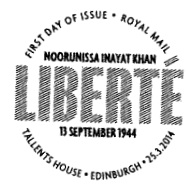
|
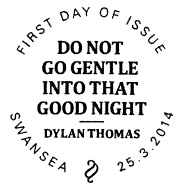
|
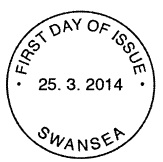
|
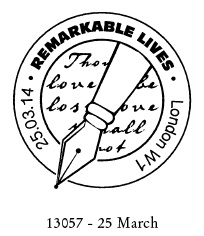
|
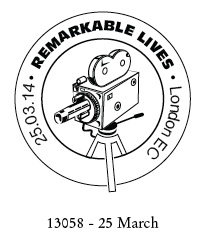
|
|
Ref FD1406TH "Liberte" Noorunissa Inayat Khan,
Philatelic Bureau Official Postmark
|
Ref FD1406PL "Do not go gentle into that good night"
Dylan Thomas, Swansea Official Postmark
|
Ref FD1406NP
Swansea Official non-pictorial Postmark
|
Ref L13057
Remarkable Lives, London W1
|
Ref L13058
Remarkable Lives, London EC
|
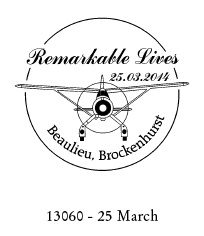 |
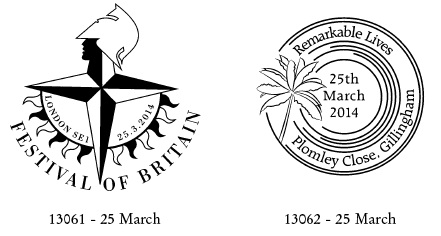
|
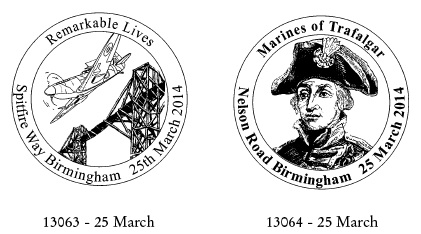
|
|
Ref L13060 Remarkable Lives, Beaulieu, Brockenhurst
|
Ref L13061 Festival of Britain, London SE1
|
Ref L13062 Remarkable Lives, Plomley Close, Gillingham
|
Ref M13063 Remarkable Lives, Spitfire Way, Birmingham
|
Ref M13064 Marines of Trafalgar, Nelson Road, Birmingham |
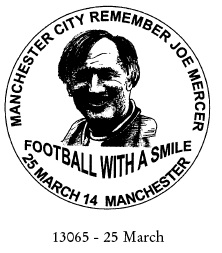 |
<<------
Ref N13065
Manchester City Remember Joe Mercer, Football with a Smile |
blank |
blank |
Postmarks produced for the Royal
Marines Commemorative Sheet are also available for use with
these stamps. |
If you would like to be contacted when
this page is updated please sign up on the ChangeDetection panel at
the top of the page.
If you have any questions, please email
us.
NB: all emails will be acknowledged in 1-2 days
unless we are away (see home page). If you do not receive an
acknowledgement please email us from a different address (eg hotmail,
gmail).
This page updated 12 March 2014
